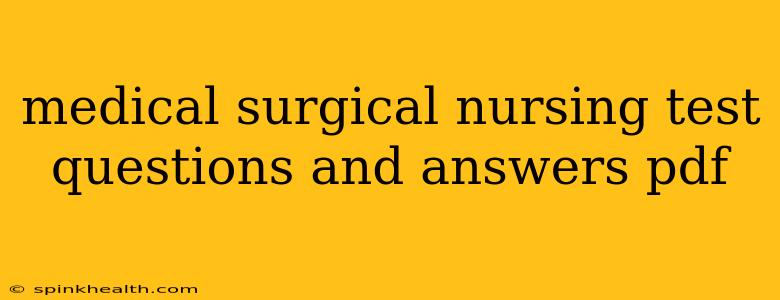Ace Your Med-Surg Nursing Exam: Practice Questions & Answers
The hum of the hospital, the constant beeping of monitors, the rush of adrenaline – a medical-surgical nurse's life is a whirlwind of challenges and rewards. Preparing for your medical-surgical nursing exam can feel like navigating a complex maze, but with the right preparation, you can conquer it. This guide provides a taste of what you might encounter, with practice questions and answers designed to sharpen your skills and boost your confidence. Remember, this is just a starting point – thorough textbook study and clinical experience are crucial for exam success.
Let's Begin!
Here are a few sample medical-surgical nursing exam questions. Try answering them before checking the explanations below.
1. A patient presents with shortness of breath, chest pain, and diaphoresis. What is your priority action?
a) Administer oxygen b) Assess vital signs c) Obtain an electrocardiogram (ECG) d) Notify the physician
2. A patient with a new ileostomy is concerned about managing their ostomy. What is the most important teaching point to emphasize?
a) Avoid gas-producing foods. b) Monitor stoma color and moisture. c) Empty the pouch when it is half full. d) Use a skin barrier to protect the peristomal skin.
3. You are caring for a patient post-op following abdominal surgery. Which assessment finding requires immediate attention?
a) Slight incisional pain b) Decreased bowel sounds c) Minimal urine output d) Elevated temperature (100.4°F)
4. A patient with diabetes is experiencing hyperglycemia. Which symptom would you expect to see?
a) Bradycardia b) Hypotension c) Polyuria d) Hypothermia
5. A patient with a urinary catheter reports burning during urination. What is your first action?
a) Increase fluid intake. b) Irrigate the catheter. c) Assess the catheter for kinks or obstructions. d) Administer an analgesic.
Answer Explanations & Further Learning
Let's go through the answers and delve into the reasoning behind them. This will help solidify your understanding.
1. The answer is (b) Assess vital signs. While all options are important, assessing vital signs (heart rate, blood pressure, respiratory rate, oxygen saturation) is the priority action. This provides a baseline to guide further interventions. The other options are essential next steps, but assessment comes first.
2. The answer is (b) Monitor stoma color and moisture. A healthy stoma should be pink or red and moist. Changes in color or moisture indicate potential problems. While all the options are important aspects of ostomy care, monitoring the stoma's health is paramount to early problem detection.
3. The answer is (c) Minimal urine output. Decreased urine output post-op can indicate dehydration, kidney dysfunction, or other serious complications requiring immediate medical attention. While the other options warrant monitoring, diminished urine output is a critical sign.
4. The answer is (c) Polyuria. Hyperglycemia leads to increased glucose in the urine, causing osmotic diuresis and resulting in frequent urination (polyuria).
5. The answer is (c) Assess the catheter for kinks or obstructions. Burning during urination with a catheter suggests irritation or infection, possibly caused by a blocked or kinked catheter. Addressing this first is crucial to preventing further complications.
Frequently Asked Questions (FAQs): Addressing Your Concerns
What resources are available for studying for my med-surge exam?
Many excellent resources exist, including nursing textbooks (like those by Lewis, Medical-Surgical Nursing), online resources like NCLEX review sites, and practice question banks. Clinical experience is invaluable, too.
How can I improve my critical thinking skills for med-surge?
Practice, practice, practice! Work through many practice questions, focusing on the rationale behind each answer. Also, actively participate in clinicals, questioning and analyzing scenarios with your preceptors.
What are common mistakes to avoid during the exam?
Read each question carefully, avoid rushing, and manage your time effectively. Don't focus solely on memorization; understand the underlying principles.
How can I reduce test anxiety?
Adequate preparation is key! A comprehensive study plan helps reduce anxiety. Additionally, relaxation techniques like deep breathing and mindfulness can be helpful.
This is just a glimpse into the world of medical-surgical nursing. Continuous learning and a dedication to providing quality patient care are essential for success in this demanding yet rewarding field. Good luck with your exam!

